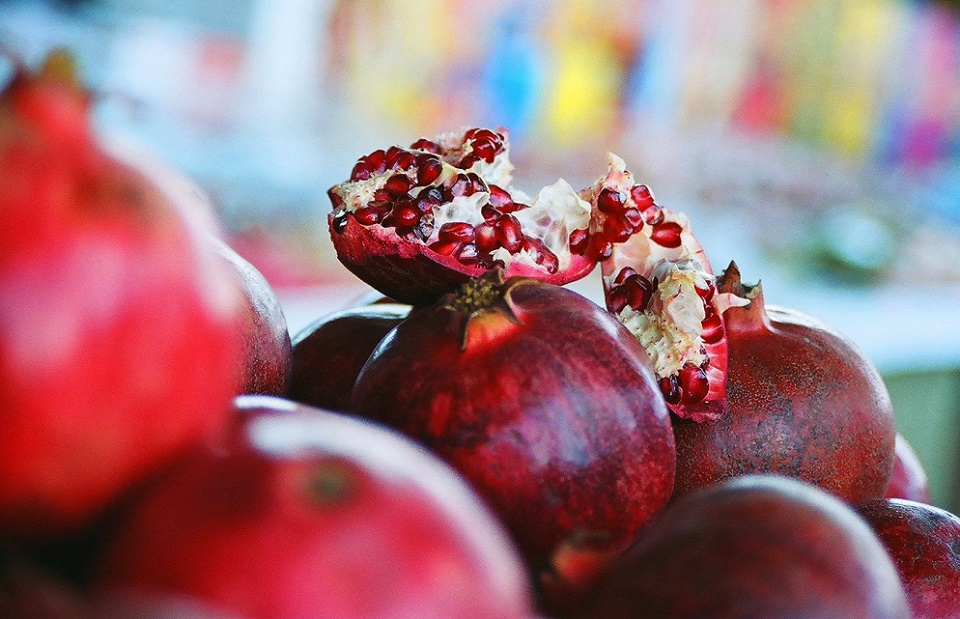
There have been several studies suggesting that pomegranate fruits may have beneficial protective effects against prostate cancer. A previous animal study Effects of daily oral administration of quercetin chalcone and modified citrus pectin on implanted colon-25 tumor growth in Balb-c mice indicated that the antioxidants from pomegranate were found to accumulate in the prostate and offset the significant growth of cancer cells. Another smaller study Clinical Benefit t in Patients with Advanced Solid Tumors Treated with Modified ed Citrus Pectin: A Prospective Pilot Study on humans indicated that pomegranate juice inhibits the growth of prostate cancer, as 22.5% of participants had stable disease after 8 weeks of MCP treatment, and 12.3% of participants had disease stabilization lasting more than 24 weeks
This new study on mice indicates how antioxidants from pomegranate accumulated in the prostate and contracted the growth of cancer cells. It was done at the University of California, Los Angeles (UCLA). The researchers identified how the antioxidants ellagitannins that are found in pomegranate was collected in certain areas of the body, and especially the prostate. They also investigated how these antioxidants affected mice with poorly functioning immune systems when the ellagitannins were seen to be even more effective against the growth of cancer cells.
Prostate cancer is the sixth leading cause of cancer-related death in men Globally.
Abstract
Our group has shown in a phase II clinical trial that pomegranate juice (PJ) increases prostate specific antigen (PSA) doubling time in prostate cancer (CaP) patients with a rising PSA. Ellagitannins (ETs) are the most abundant polyphenols present in PJ and contribute greatly towards its reported biological properties. On consumption, ETs hydrolyze to release ellagic acid (EA), which is then converted by gut microflora to 3,8-dihydroxy-6H-dibenzo[b, d]pyran-6-one (urolithin A, UA) derivatives. Despite the accumulating knowledge of ET metabolism in animals and humans, there is no available data on the pharmacokinetics and tissue disposition of urolithins. Using a standardized ET-enriched pomegranate extract (PE), we sought to further define the metabolism and tissue distribution of ET metabolites. PE and UA (synthesized in our laboratory) were administered to C57BL/6 wild-type male mice, and metabolite levels in plasma and tissues were determined over 24 h. ET metabolites were concentrated at higher levels in mouse prostate, colon, and intestinal tissues as compared to other tissues after administration of PE or UA. We also evaluated the effects of PE on CaP growth in severe combined immunodeficient (SCID) mice injected subcutaneously with human CaP cells (LAPC-4). PE significantly inhibited LAPC-4 xenograft growth in SCID mice as compared to vehicle control. Finally, EA and several synthesized urolithins were shown to inhibit the growth of human CaP cells in vitro. The chemopreventive potential of pomegranate ETs and localization of their bioactive metabolites in mouse prostate tissue suggest that pomegranate may play a role in CaP treatment and chemoprevention. This warrants future human tissue bioavailability studies and further clinical studies in men with CaP.
__________________________________
Pomegranate ellagitannin-derived metabolites inhibit prostate cancer growth and localize to the mouse prostate gland.
_________________











![OpenAI. (2025). ChatGPT [Large language model]. https://chatgpt.com](https://www.illustratedcuriosity.com/files/media/55136/b1b0b614-5b72-486c-901d-ff244549d67a-350x260.webp)
![OpenAI. (2025). ChatGPT [Large language model]. https://chatgpt.com](https://www.illustratedcuriosity.com/files/media/55124/79bc18fa-f616-4951-856f-cc724ad5d497-350x260.webp)
![OpenAI. (2025). ChatGPT [Large language model]. https://chatgpt.com](https://www.illustratedcuriosity.com/files/media/55099/2638a982-b4de-4913-8a1c-1479df352bf3-350x260.webp)








